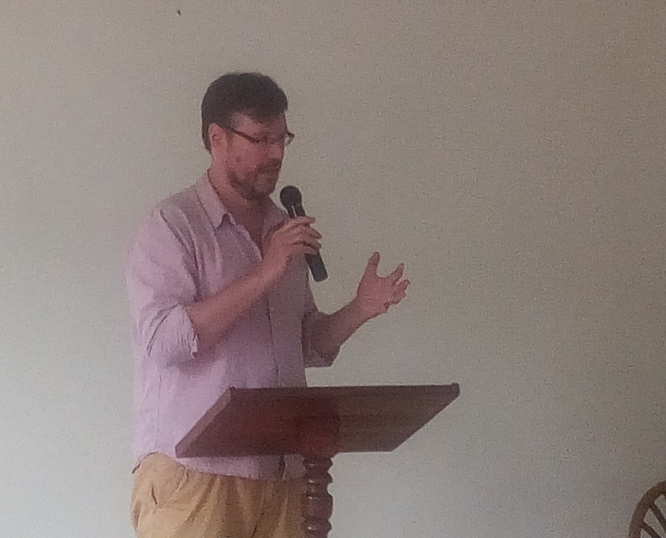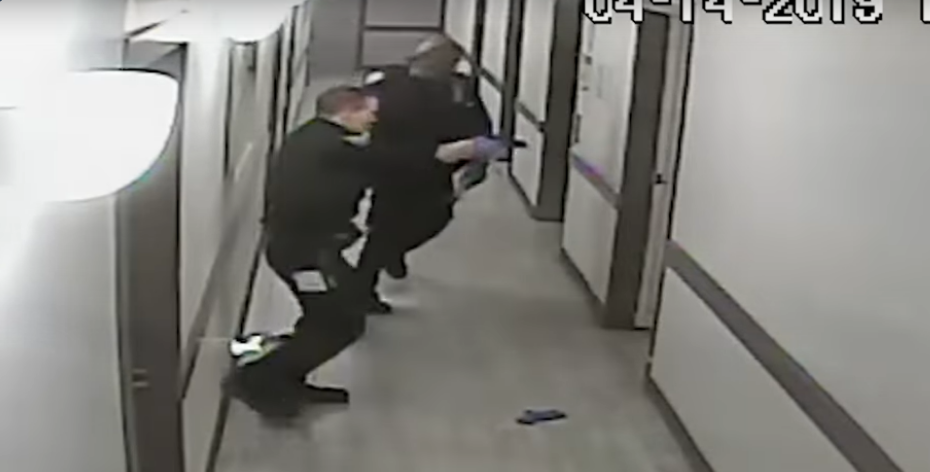Dr. Phil Clark, launching his new book; “Distant Justice” in Gulu recently
Dr. Phil Clark, a scholar, says his fear about is that the International Criminal Court (ICC) has lost its vision to the interest of powerful countries with veto powers that could have helped to bring peace in Northern Uganda during the failed Juba Peace Talks between 2006 and 2008 during. In northern Uganda the ICC was being used as a tool for the interests of world super powers like Russia, United State of America, Britain, Germany, Franc and China.
GULU-UGANDA: In his new book, “Distant Justice”,Dr. Phil Clark, of the African Center for Research, suggests that the International Criminal Court (ICC) is on the brink of collapse.
Dr. Clark who a stanch critic of ICC in his statement insinuated that now is the time for African states (including Uganda) to show greater willingness to address mass crimes.
While addressing media at Northern Uganda Media Club (NUMEC) in Gulu on Friday May 172019, says as a reader in Comparative and International Politics as SOAS University of London, his new book, which studies the impact of the ICC on Africa societies and suggests that it failing in all aspects of it operations and may collapse soon.
“ICC has been used to fuel conflicts in African states rather than stopping warlords, or giving solution to the conflicts, like in Uganda and Darfur cases. The ICC is not a global court, but is a court of few African countries that are engaged in their own conflicts.” Dr. Clark alluded.
He says he spent eleven years in field research with more than 650 interviews with ICC officials, African politicians, civil society leaders and everyday citizens in conflict-affected countries, much of which was conducted across Acholi, Lango and Teso sub-regions of Northern Uganda.
He argues the ICC is anti-African, neo-colonialists mentality and is simplistic which overstates its powers and underestimates the ability of African states to manipulate the Court for their own ends and that there are other more compelling reasons to question the court’s record in Africa.
He observed that after 17 years in operation, the ICC has also proven structurally incapable of prosecuting troublemakers who cling to power while maintaining relations with national government that have too often been and thereby confounding the claim to be apolitical the court has been unresponsive to local people who attribute greater importance to prosecuting state crimes.
Dr. Phill Clark in a damaging statement open the Pandora box by saying the ICC Prosecutor Morino Ocampuo met President Museveni in New York City to convened him that the ICC will not try UPDF Uganda Army, but only Lord’s Resistance Army (LRA) five top commanders; Joseph Kony, Vincent Otti, Okot Odyambo, Raska Lukwiya and Dominic Ongwen.
“In Uganda and DRC, close relations steamed from the fact that the ICC chased cases in those countries, approaching the respective presidents to encourage them that by investigating their situations to the Court during pre-referral negotiations, the ICC prosecution assured the Ugandan and Congolese governments that it would focus only on rebel’s leaders and not state actors. This not only ensured impunity for encouraged the head of states of these states but both states have brazenly and routinely committed crimes against civilians.” Dr. Phill Clark revealed.
He argues that ICC has sought to ensure a highly particular-rather than universal-brand of legalist, procedural justice. This approach is intolerant of alternative legal or non-legal responses to addressing mass crimes, Dr. Phil warned.
He further adds that adherence to model of “Distance justice” ostensibly to maintain impartiality, has been counter-productive. Reliance on western investigators with little or no experience in the areas where they operate, and investigations of very limited duration are major shortcoming in the ICC modus operandi. Most trails have either collapsed or been abandoned due to poor quality evidence.
“You have to hear noise coming from the actors. Last year (2018) five profiles cases was acquitted. That shows how distant justice is crumbling. Last year the Judges collapsed all cases of ICC in Afghanistan because the powerful actors like the British blocked the case. The ideas is that this in the ICC neither the investigators never have African situation before. These investigators are American, Australian and Britons. I have interacted with those investigators; they told me that they have never set foot inside Congo. This is the dilemma”, Dr. Phil argues.
Dr. Phil accused ICC of doing Public Relation work of Western Powers thereby extending distant justice. Secondly, ICC does not have knowledge of local languages and geographical location of situations, but they have been dealing with power that be.
“I have interviewed the former ICC prosecutor Marino Ocampo who said the Ituri cases would be done in few months, but to date the ICC does not have clear investigation on the ground. In the Kenya case, the Kenya government killed or bought of the witnesses. If South Africa was to say, prosecute high level Apartheid leaders instead to subject the country to Amnesty, South Africa would not be like today. The ICC needs structural reforms and political support too for it to be relevant”, he concludes.












